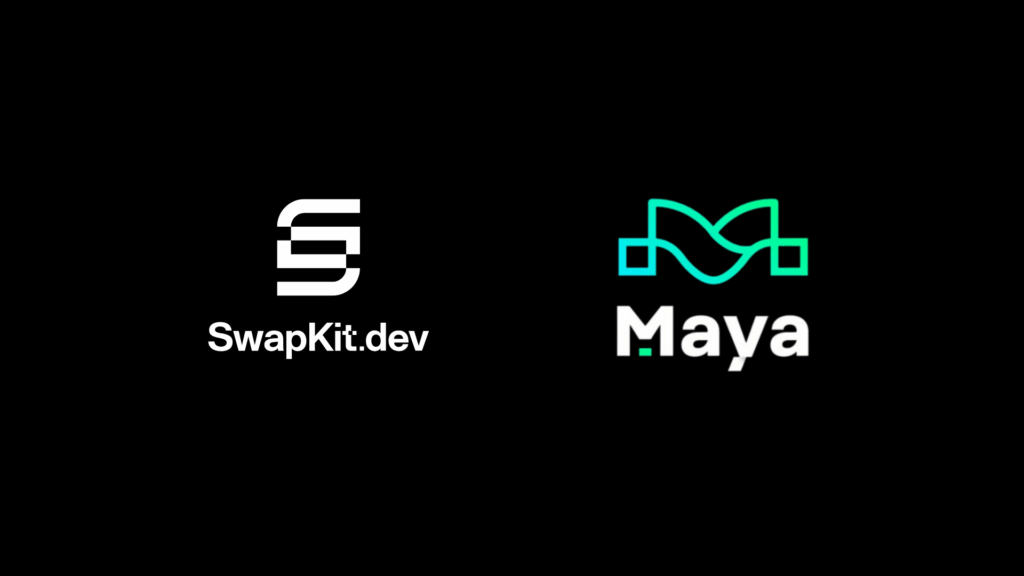
Decentralized cross-chain liquidity with enhanced privacy and unique tokenomics
Overview
Maya Protocol is a friendly fork of THORChain that enables native cross-chain swaps without wrapping or pegging assets. It manages funds directly in on-chain vaults and safeguards them through economic security using the Tendermint consensus engine.
Through SwapKit, developers can integrate Maya Protocol swaps alongside THORChain, Chainflip, and NEAR Intents — providing users with redundancy and competitive routing across multiple liquidity sources.
Supported Chains
Maya Protocol currently supports native asset swaps between:
-
- Bitcoin (BTC) – Enhanced with Taproot+ integration for improved privacy and scalability
-
- Ethereum (ETH) – Plus ERC-20 tokens
-
- BNB Smart Chain (BSC) – BEP-20 assets
-
- Dash (DASH) – Native DASH support
-
- Kujira (KUJI & USK) – Cosmos ecosystem assets*
-
- Arbitrum – Recently integrated Ethereum Layer 2 scaling solution
-
- Zcash (ZEC) – Privacy-focused cryptocurrency integration
-
- Radix (XRD) – Enabling trustless cross-chain asset swaps
Coming Soon: Cardano integration is in progress, which will unlock ADA swaps and broader Cardano ecosystem access.
-
- Note: Kujira’s existing tech/apps are expected to migrate to THORChain’s new app-layer, and the current Kujira chain may be retired from Maya in the coming months
Protocol Fees
Maya Protocol uses a dynamic fee structure similar to THORChain:
Liquidity Fees
-
- Range: 10-20 basis points (0.10% – 0.20%)
-
- Dynamic scaling: Adjusts based on pool depth and liquidity conditions
-
- Purpose: Compensates liquidity providers and maintains network security
Outbound Fees
-
- Network fees: Covers gas costs on destination chains
-
- Chain-specific: Varies by blockchain network conditions
-
- Dynamic adjustment: Scales with network congestion
Additional Features
-
- Affiliate fees: Revenue sharing opportunities for integrators
-
- DEX aggregation: Planned support for leveraging liquidity from other DEXs like Uniswap and 1inch
Fee Structure: Maya Protocol charges 10-20 basis points in liquidity fees plus outbound network fees, typically offering more predictable pricing than THORChain’s wider fee range.
Example: BTC → ETH Swap via SwapKit
import { SwapKitApi } from "@swapkit/api";
// Get Maya Protocol quote
const quotes = await SwapKitApi.getQuote({
sellAsset: "BTC.BTC",
buyAsset: "ETH.ETH",
sellAmount: "1000000", // 0.01 BTC in satoshis
providers: ["MAYACHAIN"]
});
const mayaQuote = quotes[0];
console.log({
expectedOutput: mayaQuote.expectedOutput,
liquidityFee: mayaQuote.fees.liquidity,
outboundFee: mayaQuote.fees.outbound,
totalFees: mayaQuote.fees.total,
estimatedTime: mayaQuote.timeEstimate
});
// Execute the swap
const result = await SwapKitApi.executeSwap({
route: mayaQuote,
userAddress: "your-btc-address"
});
Benefits of Using Maya Protocol via SwapKit
Enhanced Privacy Focus
- Taproot+ integration brings enhanced privacy and scalability to Bitcoin transactions, unlocking new privacy-focused DeFi use cases.
Competitive Fee Structure
- 10-20bps liquidity fees provide more predictable pricing compared to THORChain’s 5-50bps range.
Unique Tokenomics
- Different economic model from THORChain while maintaining the same proven security architecture.
Unified Integration
- Same SwapKit API structure as THORChain, Chainflip, and NEAR Intents for consistent developer experience.
Redundancy & Competition
- Maya provides an alternative liquidity source, improving execution when combined with other providers through SwapKit.
Innovation Focus
- Smart contract capabilities enable advanced DeFi tools like derivatives and algorithmic stablecoins.
Recent Maya Protocol Developments
- Arbitrum Integration
- Maya Protocol recently expanded with Arbitrum integration, adding access to Ethereum’s leading Layer 2 ecosystem.
- Cardano Integration Progress
- Cardano integration is actively in development, which will bring native ADA swaps and access to the Cardano DeFi ecosystem.
- Zcash Privacy Integration
- Zcash integration enables privacy-focused cross-chain swaps for users prioritizing transaction privacy.
- Radix Network Support
- Maya Protocol integration with Radix unlocks new routes for $63 billion of TVL on Maya-supported chains to flow into Radix.
Maya vs Other Protocols
| Feature | Maya Protocol | THORChain | Chainflip | NEAR Intents |
|---|---|---|---|---|
| Liquidity Fee | 10-20bps | 5-50bps | 1-10bps | 1bps |
| Bitcoin Support |  Native + Taproot+ Native + Taproot+ |
 Native + Taproot Native + Taproot |
 Native Native |
 Native Native |
| Privacy Focus |  Enhanced (ZEC, Taproot+) Enhanced (ZEC, Taproot+) |
 Standard Standard |
 Standard Standard |
 Standard Standard |
| Decentralization | Fully decentralized | Fully decentralized | Validator-based | Intent-based |
| Chain Coverage | 8 chains (growing) | 11 chains | 4 chains | 15+ chains |
| Fee Predictability |  High (narrow range) High (narrow range) |
 Variable (wide range) Variable (wide range) |
 High High |
 High High |
Real-World Integrations
Production Deployments:
-
- THORSwap – Major DEX aggregator powered by SwapKit
-
- Edge Wallet – Non-custodial wallet enabling decentralized cross-chain swaps
-
- Enterprise Integration – Various wallets and DeFi protocols via SwapKit
Frequently Asked Questions
Q: How is Maya different from THORChain?
Maya is a friendly fork of THORChain with complementary mission and notable design distinctions, including different tokenomics, enhanced privacy features, and more predictable fee ranges.
Q: Why choose Maya over THORChain?
Maya offers more predictable 10-20bps fees, enhanced privacy features through Zcash and Taproot+, and serves as an excellent redundancy option alongside THORChain.
Q: Does SwapKit add markup to Maya fees?
No. SwapKit passes through Maya Protocol’s native fee structure transparently with no additional markup.
Q: What happens if Maya Protocol goes down?
SwapKit automatically detects issues and can route through THORChain, Chainflip, or NEAR Intents as alternative providers.
Q: When will Cardano be supported?
Cardano integration is actively in progress and expected to follow after Arbitrum, bringing native ADA swap capabilities.
Integration Resources
-
- SwapKit Documentation – Complete integration guide
-
- Maya Protocol Docs – Protocol-specific documentation
-
- SwapKit GitHub – Open source SDK and examples
-
- Maya Block Explorer – Network statistics and monitoring
Ready to integrate Maya Protocol swaps? Get started with SwapKit